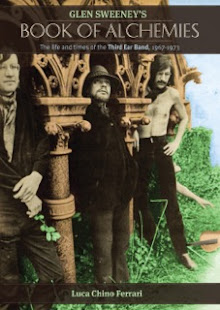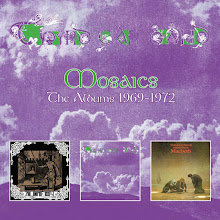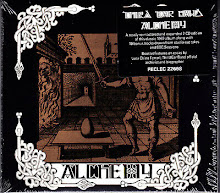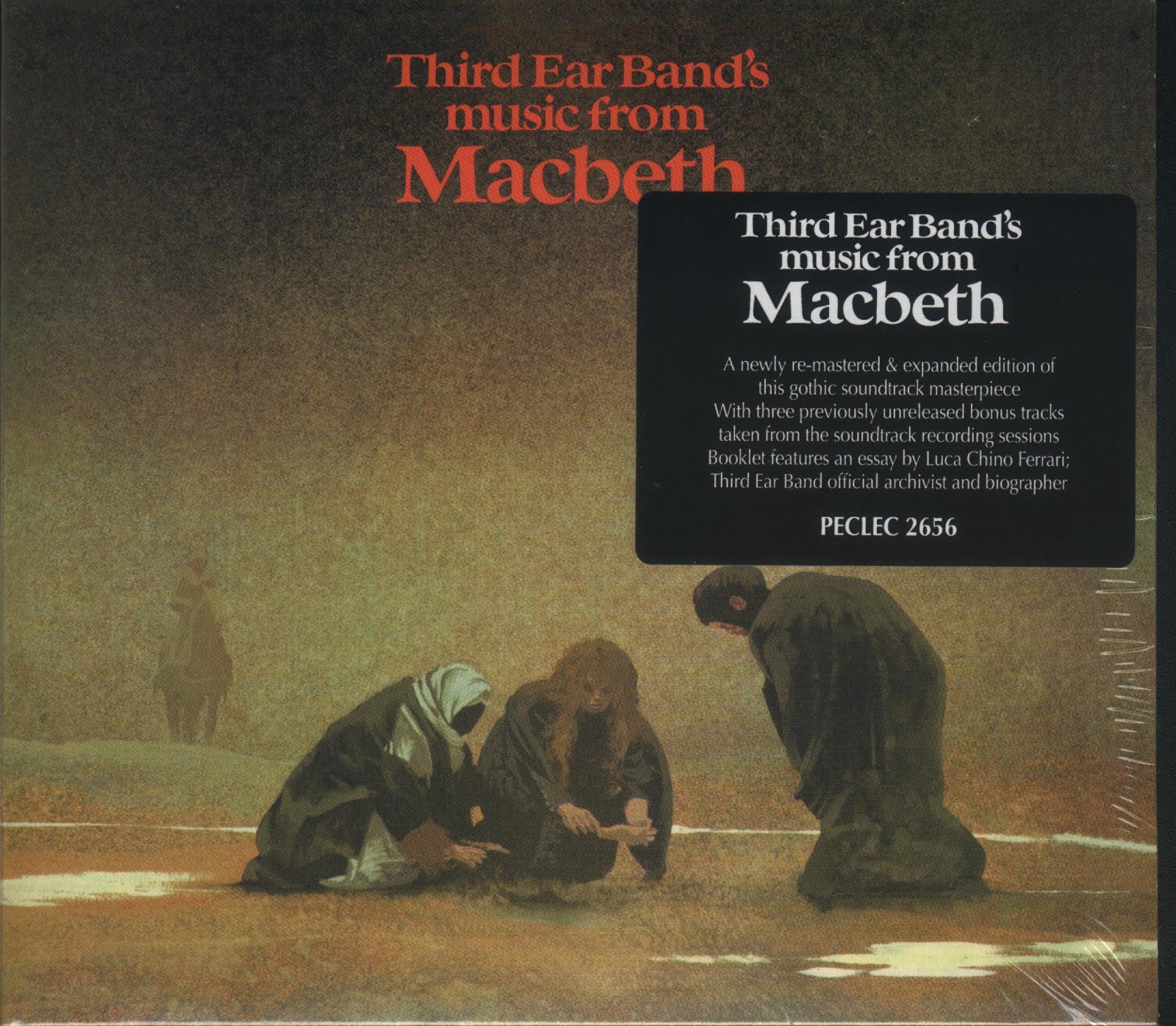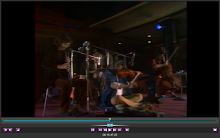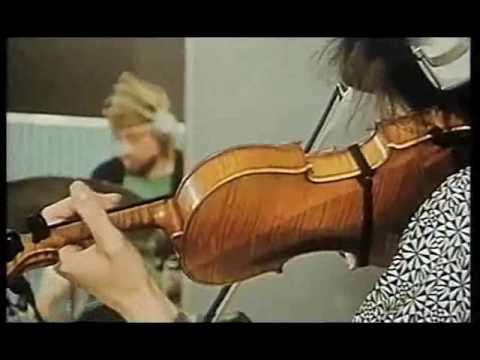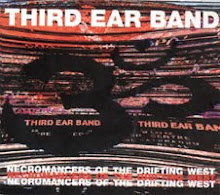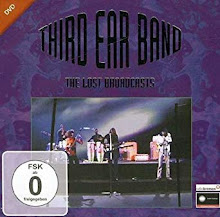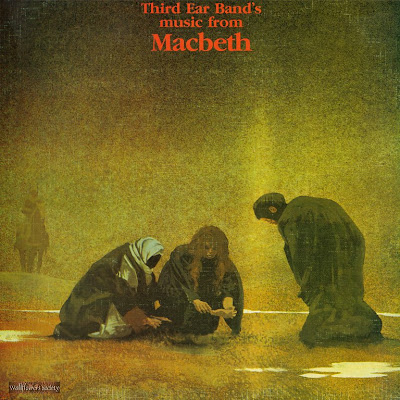According notes editor Jon Kirkman, the first (6:00) was "thought to be "Raga in D" a piece originally recorded at the sessions for the debut album "Alchemy"", but as every serious TEB fan knows (read on this archive at http://ghettoraga.blogspot.com/2010/10/5-teb-fans-cant-be-wrong-at-last-heres.html) this is a sonorous incredible mistake because actually "Raga in D" was recorded by the very first TEB line-up with acoustic instruments and very different harmonic/melodic structure (please download and compare the tracks Mr. Kirkman!)...
This DVD live in the studio version is instead the same "Eternity in D" played by the band at "John Peel Sessions" radio programme on January 7th, 1971 and recorded the same year in a Balham recording studios with the new title "Ghoo" (abbreviation of "Genetic Octopogillar Goo"): you can read a file at the page http://ghettoraga.blogspot.com/2010/09/ghoo-aka-eternity-in-d-rough-recording.html of this archive.
 |
| The Band performing "Druid Grocking". |
About “Hyde Park” (8:33), we had that short version circulating on the Net among fans as "Hyde Park Raga", recorded live in the studio for the same "Beat Club" German TV programme on September 26th, 1970 (read at http://ghettoraga.blogspot.com/2009/12/hyde-park-third-ear-band-tv-video_09.html). This is a longer more experimental version, caratherized by brilliant extensive Paul Minns' solos but a poor, slack Bridges on guitar.
 |
| Buckmaster, Bridges and Minns performing "In D". |
A statement quite arguable because that known session for John Peel (aired on July 27th, 1970) included a track titled "Druid", presumably a live rendition of the original "Druid One"... (even if we know there are some tracks titled "Druid" in the TEB repertoire...).
Also we have no proofs that a track with the name "Grocking" on the title was played by the band for John Peel: you can check the great book edited by Ken Garrer titled "The Peel Sessions" (BBC Books, UK 2007) or read a file published here at http://ghettoraga.blogspot.com/2009/12/how-many-teb-unrealized-tracks-left.html
Instead it's possible that the correct title is "David Grocking".
 |
| The TEB on the stage: note the clouds in the back... |
Rather intriguing some remarks written by musician/TEB big fan Sedayne about it: "I love the confusion over DRUID and DAVID - this obviously comes from the typeface used, where the R looks like an A and the U looks like V but I think I'll adopt the name 'David Grocking'.
If I recall right this isn't the first time DRUID has been mistaken for DAVID. I've got a laconic John Peel In Concert intro someplace in which he slights his secretary for making the same error...
And then some say Jesus of the house of David came to Glastonbury to become a druid. Listening to this music I can well believe it. Maybe his secret initiate name was David Grocking? After all in the Urban Dixctionary we read that "grokking" is:
'One who has graduated from penultimate hipster status, the educated hobo embodies various attributes from all walks of life, including those of the hipster, nerd, and mountain man variety. The educated hobo can oftentimes be seen grokking about. There can only be one educated hobo in existence.'
I'm cool with that!".
 |
| The Mysterious Man revealed: Gasper Lawal on congas performing "Hyde Park". |
Really fascinating this mixture of jazz, psychedelia, prog that was the trademark of the Band in those months, the brave attempt to mix 'old' instruments as congas (hand drums) and oboe with electric ones, with a very minimalist drums' playing.
The last track, among all, is a really good example of the futuristic cheeky approach to the sounds, with incredible improvisations by Minns, great bass groove and a quite remarkable work on guitar.
In my opinion "Druid Grocking" is the best performance, a clear confirmation the Band, after the 60's acoustic raga immersion, was experimenting brand new directions to the Land of Electricity, culminated in the wonderful Balham sessions (February 1971) and most of all in the gloomy sound of "Macbeth".
 |
| Sweeney on drums on "Druid Grocking". |
The video
Quite static, the group is recorded playing in a studio on a low stage with psychedelic effects back (colours, bubbles, clouds taken from the second album cover...) that often distort the view.
Not that great masterpiece, in short.
Anyway, some interesting clues about the mood inside the band at the time surface: Sweeney and Lawal dress black sunglasses looking like proto 'punk', Minns and Bridges look hippy...
 |
| Sweeney and Lawal with a 'punk' look performing "Druid Grocking". |
And what about the infamous double neck guitar played by Bridges that Glen Sweeney said it didn't work (interviewed by "Unhinged" fanzine in 1990)?
Here we have the definitive proof that he played both necks!
 |
| Denim Bridges with his guitar. |
So what can we say about this unexpected DVD?
A great gift, indeed. The only one visual document about the Band from the first phase...
And by the way... when a DVD edition of the rare "Abelard & Heloise" short?
 |
| Paul Minns playing great solos on "In D". |













